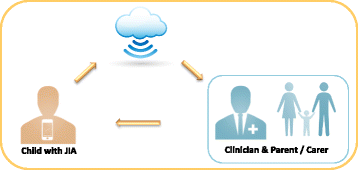Harnessing interactive technologies to improve health outcomes in juvenile idiopathic arthritis
- PMID: 28511689
- PMCID: PMC5434586
- DOI: 10.1186/s12969-017-0168-y
Harnessing interactive technologies to improve health outcomes in juvenile idiopathic arthritis
Abstract
Background: Children and adolescents with Juvenile Idiopathic Arthritis (JIA) typically have reduced physical activity level and impaired aerobic and anaerobic exercise capacity when compared to their non-JIA counterparts. Low intensity exercise regimens appear to be safe in children with JIA and may results in improvements in overall physical function. Poor adherence to paediatric rheumatology treatment may lead to negative clinical outcomes and possibly increased disease activity. This includes symptoms such as pain, fatigue, quality of life, longer term outcomes including joint damage, as well as increase of healthcare associated costs. Low adherence to medications such as methotrexate and biological-drugs remains a significant issue for paediatric rheumatologists, with alarming reports that less than half of the children with JIA are compliant to drug-therapy.
Main body: The recent advances in interactive technology resulting in a variety of wearable user-friendly smart devices may become a key solution to address important questions in JIA clinical management. Fully understanding the impact that arthritis and treatment complications have upon individual children and their families has long been a challenge for clinicians. Modern interactive technologies can be customised and accessed directly in the hands or wrists of children with JIA. These secured networks could be accessible 'live' at anytime and anywhere by the child, parents and clinicians. Multidisciplinary teams in paediatric rheumatology may benefit from adopting these technologies to better understand domains such as patient biological parameters, symptoms progression, adherence to drug-therapy, quality of life, and participation in physical activities. Most importantly the use of smart devices technologies may also facilitate more timely clinical decisions, improve self-management and parents awareness in the progression of their child's disease. Paediatric rheumatology research could also benefit from the use of these smart devices, as they would allow real-time access to meaningful data to thoroughly understand the disease-patterns of JIA, such as pain and physical activity outcomes. Data collection that typically occurs once every 1 or 3 months in the clinical setting could instead be gathered every week, day, minute or virtually live online. Arguably, few limitations in wearing such interactive technologies still exist and require further developments.
Conclusion: Finally, by embracing and adapting these new and now highly accessible interactive technologies, clinical management and research in paediatric rheumatology may be greatly advanced.
Figures
Similar articles
-
Attitudes and Approaches for Withdrawing Drugs for Children with Clinically Inactive Nonsystemic JIA: A Survey of the Childhood Arthritis and Rheumatology Research Alliance.J Rheumatol. 2017 Mar;44(3):352-360. doi: 10.3899/jrheum.161078. Epub 2017 Feb 1. J Rheumatol. 2017. PMID: 28148696 Free PMC article.
-
[New therapy approaches, better outcomes? : Results from inception cohorts for patients with juvenile idiopathic arthritis].Z Rheumatol. 2019 Sep;78(7):610-619. doi: 10.1007/s00393-019-0648-1. Z Rheumatol. 2019. PMID: 31127369 Review. German.
-
Biologics in juvenile idiopathic arthritis: a narrative review.Eur J Pediatr. 2017 Sep;176(9):1147-1153. doi: 10.1007/s00431-017-2960-6. Epub 2017 Jul 20. Eur J Pediatr. 2017. PMID: 28725955 Review.
-
Decreasing trend in the incidence of serious pneumonias in Finnish children with juvenile idiopathic arthritis.Clin Rheumatol. 2020 Mar;39(3):853-860. doi: 10.1007/s10067-019-04804-x. Epub 2019 Nov 16. Clin Rheumatol. 2020. PMID: 31732822
-
Self-reported pain and disease symptoms persist in juvenile idiopathic arthritis despite treatment advances: an electronic diary study.Arthritis Rheumatol. 2014 Feb;66(2):462-9. doi: 10.1002/art.38223. Arthritis Rheumatol. 2014. PMID: 24504820 Free PMC article.
Cited by
-
Effectiveness of eHealth and mHealth Interventions Supporting Children and Young People Living With Juvenile Idiopathic Arthritis: Systematic Review and Meta-analysis.J Med Internet Res. 2022 Feb 2;24(2):e30457. doi: 10.2196/30457. J Med Internet Res. 2022. PMID: 35107431 Free PMC article.
-
Feasibility and safety of a 6-month exercise program to increase bone and muscle strength in children with juvenile idiopathic arthritis.Pediatr Rheumatol Online J. 2018 Oct 22;16(1):67. doi: 10.1186/s12969-018-0283-4. Pediatr Rheumatol Online J. 2018. PMID: 30348221 Free PMC article. Clinical Trial.
-
Paediatric Rheumatology Fails to Meet Current Benchmarks, a Call for Health Equity for Children Living with Juvenile Idiopathic Arthritis, Using Digital Health Technologies.Curr Rheumatol Rep. 2024 Jun;26(6):214-221. doi: 10.1007/s11926-024-01145-w. Epub 2024 Mar 11. Curr Rheumatol Rep. 2024. PMID: 38466514 Free PMC article. Review.
-
Validation of an Electronic Visual Analog Scale mHealth Tool for Acute Pain Assessment: Prospective Cross-Sectional Study.J Med Internet Res. 2020 Feb 12;22(2):e13468. doi: 10.2196/13468. J Med Internet Res. 2020. PMID: 32049063 Free PMC article.
-
Using Digital Health Technologies to Monitor Pain, Medication Adherence and Physical Activity in Young People with Juvenile Idiopathic Arthritis: A Feasibility Study.Healthcare (Basel). 2024 Feb 2;12(3):392. doi: 10.3390/healthcare12030392. Healthcare (Basel). 2024. PMID: 38338277 Free PMC article.
References
-
- Australian Institute of Health and Welfare, [AIHW]. What is juvenile arthritis? 2015. http://www.aihw.gov.au/juvenile-arthritis. Accessed 24 May 2016.
-
- Laila K, Haque M, Islam MM, Islam MI, Talukder MK, Rahman SA. Impact of Juvenile Idiopathic Arthritis on School Attendance and Performance. American Journal of Clinical and Experimental Medicine. 2016; doi:10.11648/j.ajcem.20160406.15
-
- Cingi C, Yorgancioglu A, Cingi CC, Oguzulgen K, Muluk NB, Ulusoy S, et al. The “physician on call patient engagement trial” (POPET): measuring the impact of a mobile patient engagement application on health outcomes and quality of life in allergic rhinitis and asthma patients. Forum Allergy Rhinol 2015; doi:10.1002/alr.21468. - PubMed
Publication types
MeSH terms
Substances
LinkOut - more resources
Full Text Sources
Other Literature Sources
Medical


